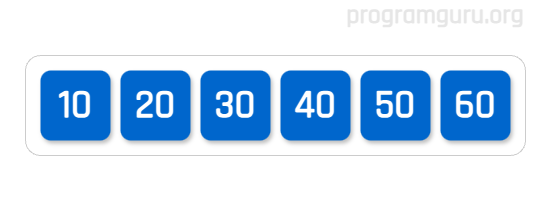Arrays in C
In this tutorial, we will learn about arrays in C. We will cover the basics of declaring and using arrays, including accessing and modifying elements.
What is an Array
An array is a collection of elements of the same type stored in contiguous memory locations. It allows you to store multiple items under a single name and access them using an index.

Syntax
The syntax to declare an array in C is:
type arrayName[arraySize];Working with Arrays
We will learn how to declare, initialize, access, and modify arrays in C.
Example 1: Declaring and Initializing an Array
- Declare an integer array named
arrwith 5 elements. - Initialize the array with values {1, 2, 3, 4, 5}.
- Print all the elements of the array.
C Program
#include <stdio.h>
int main() {
int arr[5] = {1, 2, 3, 4, 5};
for (int i = 0; i < 5; i++) {
printf("%d ", arr[i]);
}
return 0;
}Output
1 2 3 4 5
Example 2: Accessing Array Elements
- Declare an integer array named
arrwith 5 elements. - Initialize the array with values {10, 20, 30, 40, 50}.
- Access and print the third element of the array.
C Program
#include <stdio.h>
int main() {
int arr[5] = {10, 20, 30, 40, 50};
printf("The third element is: %d\n", arr[2]);
return 0;
}Output
The third element is: 30
Example 3: Modifying Array Elements
- Declare an integer array named
arrwith 5 elements. - Initialize the array with values {5, 10, 15, 20, 25}.
- Modify the second element of the array to 50.
- Print all the elements of the array.
C Program
#include <stdio.h>
int main() {
int arr[5] = {5, 10, 15, 20, 25};
arr[1] = 50;
for (int i = 0; i < 5; i++) {
printf("%d ", arr[i]);
}
return 0;
}Output
5 50 15 20 25